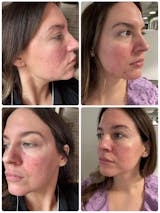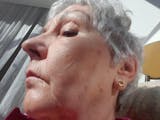
Tried just about every acne treatment to get rid of acne but to no avail? Don’t despair. To see clearer skin, you probably just need some changes with consistency.
The following tips from dermatologists can help you get started.
1. Remind me, what causes acne?
At the root of all acne is a clogged pore.
Acne occurs when the pores of your skin become blocked with oil, dead skin, or bacteria - such as:
- Too much oil is produced by your follicles
- Dead skin cells accumulate in your pores
- Bacteria build up in your pores

The good news is over 95% of the people who have acne can treat using non-prescription products without paying big bucks to see a dermatologist or aesthetician.
Here are the best acne treatments for occasional to moderate acne:
-
Retinoids - The primary tools¹ which dermatologists use to treat breakouts.
A derivative of vitamin A, they are well researched to promote skin renewal, reduce blemishes and boost your skin’s collagen production. Retinol is a gentle variant of retinoids ². -
AZA - It’s a mystery why some great skincare ingredients fly under the radar.
A great deal of research has shown that AZA can significantly diminish the appearance of skin blemishes, help fade post-acne marks and other discolorations, refine skin’s surface, and reveal a more even skin tone³. -
Salicylic acid - This helps clear mild acne, inflammation and unclogs pores⁴. It comes OTC in lower doses, but you can also get it from a doctor.
Avoid cleansers with this ingredient as they don't stay long enough on the skin. -
Benzoyl peroxide - This fights P. acnes bacteria that causes pimples⁵.
But it isn’t without its downsides. The leave-on creams and cleansing treatments can dry out sensitive skin and bleach clothing if you aren’t careful. Best to stick to formulations that have no more than 2% of it.
Consider Clear Out Clarifying Lotion. It uses pharma-grade* retinol and AZA to perpetually flush out clogs from your pores. The AZA is also very effective in flattening existing pimples.
*Pharma-grade ingredients are certified by US Pharmacopeia standards a level of purity and potency which cosmetic grade ingredients do not provide.
See what others say about Clear Out...
Mim (@acneisntugly), a teacher from Southampton, battled hormonal cystic acne for over 6 years before she tried Clear Out…
Individual results may vary
“Out of everything I’ve tried over the 6 years I’ve battle acne on and off it’s by far stood out as being one of the most effective with no side effects (after the initial “purge”). I’ve used nothing but Clearly Basics for 12 months now and it still exceeds my expectations!”
Bea (@beas.bareskin), a student from California, who has tried almost everything from prescription medication, chemical peels to a long list of brands (Clean & Clear, Clearasil, Proactiv, St. Ives, etc.) ...which didn't work, until Clear Out.
Individual results may vary
"My skin looks so good now! I've had a few of my classmates tell me my skin texture looks so nice and even now. 😊
As an acne survivor, I'll never recommend a product if it's not effective. If any of you are wondering what products I use that have been giving me positive results, it's the Clearly Basics' full lineup."
2. Give any product or treatment you are trying at least 8 weeks to work
Using a new acne product every few days may seem useful, but that approach can worsen acne. Clearing clogs needs time to work. Using a different product every few days may irritate your skin, causing new breakouts.
Try 1 or 2 products, and give them time to work. Trying too many products can stress your skin, worsening acne.
If a treatment works for you, you should notice some improvement in 4 to 6 weeks. However, for some people, it can take 2 to 3 months or longer to see clearing.
If you notice improvement, don't stop. Even when you see clearing, you'll want to keep using the product or treatment. This helps to prevent new breakouts.
98% of users saw an improvement after a bottle of Clear Out. It carries a 90-day money back guarantee so if you don’t see a noticeable results after a bottle, you will get a full refund T&Cs apply.
Note: If you have very severe acne, you'll need to visit a dermatologist. Acne products over the counter won't be able to treat very severe acne.
3. Only wash your face twice a day
Acne-prone skin is usually sensitive. Washing more than twice a day can irritate your skin, making acne worse.
For best results, dermatologists recommend washing your face when:
- You wake up
- You're ready to go to bed
- It gets sweaty
Find a simple and gentle cleanser that will wash off the day’s grime, sweat, and pollution. If your skin is “squeaky clean” after washing your face, your cleanser may be too strong.
If your skin tends to be dry, look for a soap-free, cream-based cleanser. For oily skin, go for a foaming cleanser more effective at reducing the oil.
4. Choose skincare products and cosmetics that don’t cause acne
Yes, you do need to moisturize, even if you have acne. Skipping this critical step may leave you plagued with rough, flaky, and red patches, which only brings more attention to your breakouts.
However, it's crucial to use skincare/cosmetic products that don't cause acne. Here's what you need to look out for.
Read the label carefully. On the package, you may see one of the following:
- Non-comedogenic (won't clog pores)
- Non-acnegenic
- Oil free
If you have oily skin, consider the SH+ Matte Hydrating Serum. It breaks the vicious cycle (clogged pores -> more oil production -> more clogged pores) by properly hydrating your skin.
If you have dry, sensitive or combination skin, consider the Protective Peptide Moisturizer. It helps to repair the skin barrier that's damaged from drying acne products and medications.
5. Follow instructions/directions
While using any Over The Counter (OTC) acne treatment can seem pretty straightforward, how much you use and how often you use it can make a huge difference.
Be sure to follow the instructions/directions!
6. Stop scrubbing your face!
If your skin feels greasy, dirty, or grimy, you may be tempted to scrub it clean. Don’t!
Scrubbing can irritate acne-prone skin, which worsens acne.
7. Resist touching, picking, and popping your acne
Popping a pimple may seem like the fastest way to clear it, but popping it can actually make things worse. We can't stress this enough.
Every time you touch, pick, or pop, you can worsen acne.
8. Wash your pillowcases, hats, and other things that touch your acne-prone skin
Dead skin cells, bacteria, and dirt will build up on these surfaces, which can clog your pores. Washing what touches your acne-prone skin can prevent this.
Changing your sheets every week and your pillowcase twice a week can make a difference.
9. Enlist a dermatologist's help
If you still have acne after trying these tips — or you have acne cysts or nodules (deep blemishes that leave scars when they clear) — you probably need to visit a dermatologist.
With today's acne treatments and a dermatologist's expertise, virtually every case of acne can be cleared. A dermatologist can tailor a treatment plan to your unique needs.
References:
1. James Leyden et al, 2017 : Why Topical Retinoids Are Mainstay of Therapy for Acne
2. Marissa Laliberte : Retinol-vs.-Retinoids
3. Paula Begoun : Everything You Need to Know About AZA for Skin
4. Kristeen Cherney, 2019 : Salicylic Acid vs. Benzoyl Peroxide: Which Is Better for Acne?
5. Jessica Cruel, 2019 : 12 Acne Treatments That Really Work, According to Dermatologists






